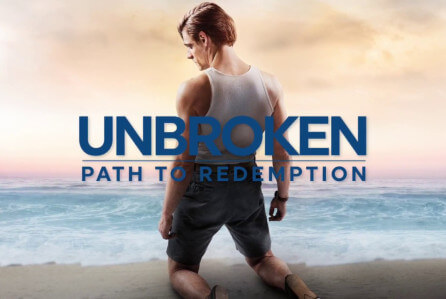After an overture that zips through a highlight reel of Zamperini’s life—his high school record for the mile run (which earned him the nickname the “Torrance Tornado”), his performance at the 1936 Olympics, his 47-day ordeal while lost at sea, and his subsequent capture by the Japanese—Path To Redemption picks up with the now-famous hero (Samuel Hunt, in the role previously played by Jack O’Connell) returning to his family home in Torrance, California. After that opening refresher, though, one would be forgiven for wondering: What exactly is Zamperini being redeemed for? Directed by God’s Not Dead series helmer Harold Cronk, the film gets right to the point. Struggling with PTSD, plagued by nightmares and hallucinations involving his primary tormentor during captivity, Mutsuhiro “The Bird” Watanabe, and generally adrift in postwar life, Zamperini quickly turns to drink to assuage his sorrows. The problem (apparently) recedes enough for him to woo and marry Cynthia Applewhite (Merritt Patterson)—he doesn’t touch a drop through their brief courtship—but returns in full force after an ankle injury nixes his chances at running in the upcoming Olympic Games in London. He blames God for his problems, refuses to seek help, and quietly nurses a desire for revenge on his former captors. Cue the battle for Zamperini’s soul.
Despite Path To Redemption’s lackluster pedigree, there aren’t actually that many risible elements in the film (though that assessment does factor in its “advantage” of following a thoroughly disposable Hollywood effort). There’s some clunky CGI and a conspicuously bad wig; a widowed black neighbor, Lila (Vanessa Bell Calloway), who shows up solely to offer Cynthia help and advice; and a “road to Damascus” moment involving the serendipitous repair of a building elevator. For the most part, though, the script hews to the typical dramatic contours of a marriage troubled by unemployment, unresolved anger, and alcoholism—pro forma stuff, too blandly treated to inspire much more than indifference. (Cronk occasionally incorporates images from Unbroken, shot by Roger Deakins, a choice that only throws his own film’s middling craft into sharp relief.) It’s as if everyone involved in the project were afraid to obscure the film’s message with even a hint of aesthetic vigor.
They needn’t have worried. As delivered from a pulpit by the late pastor and BGEA namesake Billy Graham (here played by his grandson, Will Graham) during one of the now-famous preacher’s evangelical crusades in 1949, the message is unmissable: Have faith in God and he will deliver you, no matter what your situation. No wonder, then, that after Zamperini sinks to his knees during an altar call at the Greater Los Angeles Revival, he quickly disposes of all drink and is instantly freed from his nightmares. Overflowing with a newfound grace, he even travels to Tokyo to visit a prison for Japanese war criminals.
Unbroken: Path To Redemption ultimately preaches forgiveness—a message that, in and of itself, is unobjectionable. (“When I finally found my redemption / You found me and You made me whole,” sings Switchfoot’s Jon Foreman over the closing credits.) But that only makes the closing scene—which sees a group of former Japanese soldiers flocking around Zamperini as he shakes their hands and offers his forgiveness (variations on “It’s okay” and “God bless”) while bathed in a messianic glow—that much more galling. It becomes abundantly, unambiguously clear, if it weren’t already, just who this movie is for.












![HBO teases new Euphoria, Larry David, and much more in 2026 sizzle reel [Updated]](https://img.pastemagazine.com/wp-content/avuploads/2025/12/12100344/MixCollage-12-Dec-2025-09-56-AM-9137.jpg)




























